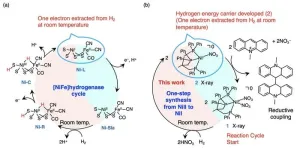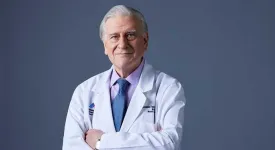(Press-News.org) An international team has developed the first comprehensive framework for designing networks of marine protected areas that can help vulnerable species survive as climate change drives habitat loss.
In a paper published Oct. 26 in One Earth, the researchers outlined guidelines for governments to provide long-distance larval drifters, like urchins and lobsters, as well as migratory species, like turtles and sharks, with protected stopovers along coastal corridors. Led by Stanford marine conservation scientist Nur Arafeh-Dalmau, the team included 50 scientists and practitioners from academia, conservation organizations, and management agencies from the U.S., Mexico, and Australia.
The guidelines come at a critical time as nearly every country in the world has committed to protect 30% of land and sea by 2030. Marine protected areas and similar conservation measures on land connect habitats fractured by generations of human development or erratically carved up by wildfires and heat waves.
“Until now, marine protected areas have been designed for biodiversity conservation, but not necessarily for climate resilience,” said Arafeh-Dalmau, a postdoctoral scholar in the Oceans Department at the Stanford Doerr School of Sustainability and an honorary fellow at The University of Queensland. “They suffer from climate impacts but aren’t designed to endure them.”
Enter the Southern California Bight
As a case study, the authors used the 21 biological and physical guidelines presented in their framework to map out protections for giant kelp ecosystems and species across the Southern California Bight. This vast region is distinguished by a gradual bend in the southerly trajectory of California’s coastline where it curves to the southeast along the peninsula of Baja California, Mexico.
Here, giant kelp forests provide nursery areas, shelter from predators and storms, and food to hundreds of commercially and culturally valuable species. In recent years, marine heat waves and prolonged periods of low dissolved oxygen have led to the collapse of commercially valuable fisheries like jumbo squid and abalone, jeopardizing the livelihoods of local communities.
Though Baja California is home to large marine protected areas and in the process of designing more, less than 1% of coastal waters are fully protected and prohibit extractive activities like fishing or drilling. In California, marine protected areas comprise 16% of state waters, half of which are fully protected. According to the California Department of Fish and Wildlife, these protected waters make up the largest ecologically connected marine protected area network in the world.
However, the network doesn’t account for how species move between the U.S. and Mexico, which means even if one country protects species’ nurseries, those benefits are lost if protections end a short drift into the neighboring country where larvae might settle and grow into adults.
“We designed a systematic approach to help resource managers stay ahead of the curve and anticipate rather than react to climate change,” said co-lead author Adrian Munguia Vega, a genomics researcher at The University of Arizona and the Applied Genomics Lab in Mexico. “A big part of that is showing how entire marine ecosystems and the species that inhabit them are connected by ocean currents that do not stop at the international border. Thus, we need coordinated efforts and protections across political boundaries.”
Integrating climate
Government agencies charged with establishing new marine protected areas typically refer to biological and physical criteria developed by scientists over the past two decades. The study authors expanded these guidelines from acknowledging the need to address climate adaptations to explicitly planning for how various future climate scenarios might play out.
For example, conservation planners today try to provide enough time for threatened species to recover from overfishing or habitat loss before allowing extractive or harvesting activities, but few models have considered how worsening marine heat waves will lengthen that recovery period. The new framework requires marine resource managers to evaluate whether proposed timelines will facilitate recovery of vulnerable species over the next decade or even century.
Management authorities also currently consider whether protected areas include the full range of habitats that regional species need to thrive. In the Southern California Bight, they might prioritize conserving a variety of sandy beaches, tidal flats, rocky reefs, and kelp forests. In addition to habitat diversity, the researchers prioritized habitat persistence or a habitat’s presence over time. Considered “climate refugia,” these habitats often experience natural temperature swings from local currents and can provide consistent relief for species faced with extreme thermal shocks.
“Climate extremes don’t stop at the boundary of a marine protected area,” said co-author Fiorenza Micheli, chair of the Oceans Department and co-director of the Center for Ocean Solutions. “If California’s network of marine protected areas had been designed with climate considerations, it would look different.”
Putting the framework into practice
The researchers examined decades of satellite imagery to map giant kelp persistence along 1,678 miles (2,700 kilometers) of continuous coastline in the Southern California Bight and quantify how many safe havens they provide for larvae spawned by sea cucumbers, sea urchins, abalone, and California sheephead. They found that under current protection schemes, marine heat waves expected over the next 50 years will splinter the suitable habitat for these larvae. The authors estimate ecological connectivity, a measure of the animals’ ability to move freely from place to place, will fall by about half, while population density could decline by as much as 90%. This would mean smaller gene pools and greater risk of population collapse.
Conventional assessment methods prioritize protection of areas that have the greatest number of kelp species. The new framework, by contrast, identified sites where kelp have the highest chance of survival and are more likely to provide a stable habitat for other marine species to reproduce. They recommended a series of protected areas that link isolated populations like beads of a necklace along the Southern California Bight.
“This stepping stone strategy can be very cost-effective and cheaper for everyone,” said Arafeh-Dalamu, who documented Mexico’s worst marine heat wave from 2014 to 2016. “Maybe you need fewer areas to be protected if you are protecting the important areas.” Plus, he added, the collaboration between countries can strengthen research capacity, and ideally, diplomacy.
“We have the information and tools to design and implement marine conservation in a way that explicitly and proactively accounts for climate change,” said Micheli. “Now is the time to understand where we strategically invest in expanding and strengthening protection so these ecosystems have a future.”
Arafeh-Dalmau is also affiliated with the University of California Los Angeles.
Micheli is also a professor of oceans, a professor, by courtesy, of biology, and a senior fellow at the Stanford Woods Institute for the Environment.
Other Stanford co-authors include Oceans Department postdoctoral scholars Carolina Olguín-Jacobson and Juan Carlos Villaseñor-Derbez and PhD student Christopher J. Knight. Olguín-Jacobson is also affiliated with Griffith University and Villaseñor-Derbez is also affiliated with the University of California Santa Barbara. Alfredo Giron-Nava, who is now Head of the World Economic Forum’s Ocean Action Agenda and Friends of Ocean Action, worked on the research as an André Hoffmann Fellow at the Stanford Center for Ocean Solutions. Alexandra Smith, who is now affiliated with Scoot Science, worked on the research as a research technician in the Oceans Department.
Additional co-authors are affiliated with The University of Queensland, University of California Los Angeles, Universidad Autónoma de Baja California, Comunidad y Biodiversidad, University of the Sunshine Coast, Nelson Mandela University, Centro de Investigación y de Educación Superior de Ensenada, University of California Davis, San Diego State University, University of Georgia, Universidad Autónoma de Baja California Sur, University of California San Diego, California Ocean Protection Council, The Nature Conservancy, University of California Santa Cruz, King Abdullah University of Science and Technology, MarFishEco Fisheries Consultants Ltd, Heriot-Watt University, Tijuana River National Estuarine Research Reserve, Instituto Politécnico Nacional, Centro de Estudios Biológicos, Medio Ambiente, y Recursos Naturales, Drexel University, and the California Department of Fish and Wildlife.
This research was supported by the Fundación Bancaria ‘la Caixa’ under a postgraduate fellowship, The University of Queensland, the Winifred Violet Scott Charitable Trust, a UC-Mexus Collaborative Grant, and National Science Foundation grants.
END
Marine protected areas and climate change
2023-10-26
ELSE PRESS RELEASES FROM THIS DATE:
Genetics links endometriosis and IBS
2023-10-26
University of Queensland researchers have shown that endometriosis and irritable bowel syndrome (IBS) share genetic risk factors, explaining why patients with one condition may also have the other.
Professor Grant Montgomery and Dr Sally Mortlock at UQ’s Institute for Molecular Bioscience found a significant relationship between the risks for endometriosis and common gastrointestinal disorders such as IBS, peptic ulcer disease (PUD) and gastro-oesophageal reflux disease (GORD).
“This genetic finding supports the clinical observation of an increased incidence of gastrointestinal disorders in women with endometriosis,” ...
Regenstrief, VA researchers co-edit journal special supplement addressing far-reaching impact of EHR transitions
2023-10-26
INDIANAPOLIS -- Two Regenstrief Institute and U.S. Department of Veterans Affairs researchers are key leaders of a national journal’s special supplement designed to help address the plethora of issues that can accompany a healthcare system’s transition to a new electronic health record (EHR) system.
Regenstrief Institute’s David Haggstrom, M.D., MAS, and Michael Weiner, M.D., MPH, are among four guest editors who have spent the last two years leading content development for a Journal of General Internal Medicine (JGIM) special supplement ...
City of Hope, TGen awarded five-year, $4.5 million grant to advance liquid biopsy for pancreatic cancer
2023-10-26
LOS ANGELES and PHOENIX — City of Hope®, one of the largest cancer research and treatment organizations in the United States, and TGen are leading an international group that has been awarded $4.5 million to validate a liquid biopsy for the early detection of pancreatic cancer. The blood-based diagnostic developed by the National Cancer Institute’s Pancreatic Cancer Detection Consortium (PCDC) leverages exosomal microRNAs that serve as a biomarker or unique RNA fingerprint for the early detection of disease or recurrence.
Enrollment of patients with early-stage pancreatic ductal adenocarcinoma (PDAC), a ...
Mount Sinai receives $4.6 million from The Pershing Square Foundation to support women’s health research and careers for women in science
2023-10-26
(New York, NY – October 26, 2023) – The Icahn School of Medicine at Mount Sinai has received a $4.6 million gift from The Pershing Square Foundation to support women’s health research and advance careers for female scientists. Part of an original nearly $21 million gift that expanded a COVID-19 testing program for New York City schools and other organizations, this boost in women-focused initiatives connects The Pershing Square Foundation’s interest in supporting women in science to Mount Sinai’s leading researchers and key initiatives in gender-based science and health.
“We ...
Announcing the ADA Forsyth Institute: a world-class organization for oral health research and innovation
2023-10-26
SOMERVILLE, Mass., Oct. 26, 2023 – The American Dental Association (ADA) and the Forsyth Institute today announced the formation of the ADA Forsyth Institute, which brings together unparalleled talent, visionary research opportunities and dynamic innovation prospects, dedicated to advancing oral health through scientific innovation and research.
“The new ADA Forsyth Institute will continue to advance oral and overall health through ground-breaking research and innovation,” said Massachusetts Governor Maura Healey. “The Forsyth ...
Early whaling eradicated species from local waters
2023-10-26
The industrial whaling of the 19th and 20th centuries almost wiped out several species. However, even though whaling took place on a much smaller scale before this period, it was enough for at least two species to disappear completely from European waters.
These two species used to be among the most common, but now one of these species is on the verge of extinction.
“Whaling was widespread from a very early time. This had major consequences for species in Europe,” says Youri van den Hurk, a ...
Fungi used in food production could lead to new probiotics
2023-10-26
Washington, D.C. — Many fungus strains have been used and selected by the food industry for their capacities to ferment, produce flavors or produce heterologous molecules. According to a new study, 2 fungi used to produce food products have potential probiotic effects on gut inflammation. The study, published in mSystems, a journal of the American Society for Microbiology, demonstrates a possible new way to develop new probiotics.
“There is much to learn by studying the role of the ...
A potentially cheaper and 'cooler' way of hydrogen transport
2023-10-26
Fukuoka, Japan—In the continued effort to move humanity away from fossil fuels and towards more environmentally friendly energy sources, researchers in Japan have developed a new material capable storing hydrogen energy in a more efficient and cheaper manner. The new hydrogen energy carrier can even store said energy for up to three months at room temperature. Moreover, since the material is nickel based, its cost is relatively cheap. The results were reported in Chemistry—A European Journal.
As humanity combats the ongoing climate crisis, ...
New guide details menopause’s effects on the workplace, other surprising impacts
2023-10-26
A sweeping new guide to menopause by a UVA Health expert and collaborators highlights the profound and sometimes surprising effects the “change of life” can have on women’s lives, health, workplaces and even finances.
The paper represents a holistic review of what we know about menopause and what we still need to learn. While it is directed primarily at doctors and scientists, it offers fascinating insights into how menopause affects American women and women worldwide.
According to article co-author JoAnn V. Pinkerton, MD, UVA Health's director of midlife health, such insights represent ...
Mount Sinai renames top-ranked heart hospital to honor Valentin Fuster, MD, PhD, and his legacy of excellence
2023-10-26
Mount Sinai Health System announced today that “Mount Sinai Fuster Heart Hospital” is the new name for its top-ranked heart service, formerly known as Mount Sinai Heart. The renaming honors Valentin Fuster, MD, PhD, Physician-in-Chief of The Mount Sinai Hospital and President of the Fuster Heart Hospital, for the immeasurable impact that he has made and will continue to make on the field of cardiology and his leadership at Mount Sinai.
Over the last 25 years, Dr. Fuster has transformed Mount Sinai’s heart service into a world-leading center for cardiovascular disease, providing exceptional and compassionate care for cardiac patients, new and innovative ...






